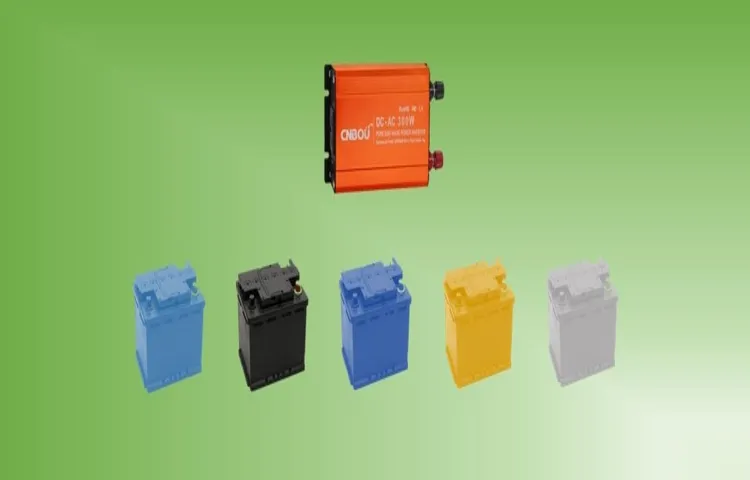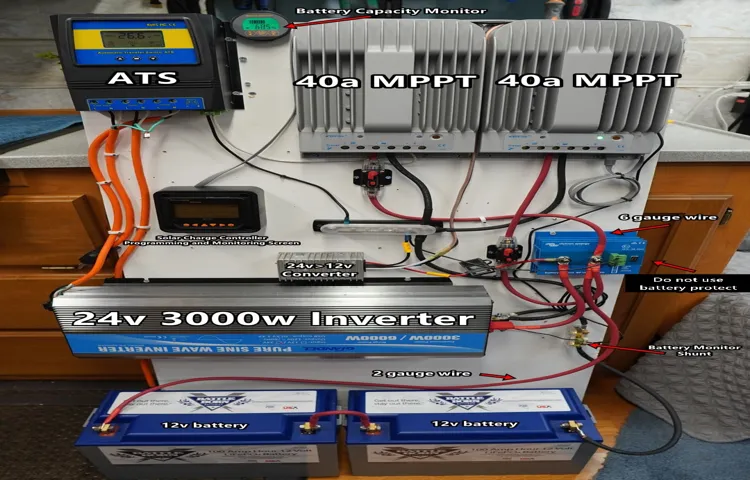Are you wondering how an inverter battery works and what its voltage means? In this blog, we will delve deep into understanding inverter battery voltage and its significance. An inverter battery is an essential component of an inverter system, which converts DC (direct current) power into AC (alternating current) power. But why is the voltage of the battery important? Well, just like the heart of a human body, the voltage of an inverter battery is the life force that powers all your electrical appliances during power outages.
Think of it as the fuel that keeps your inverter running smoothly. Without the right understanding of inverter battery voltage, you might find yourself in a situation where power outages become more frequent or your appliances don’t run optimally. So, let’s jump right in and demystify the concept of inverter battery voltage!
Table of Contents
What is an Inverter Battery
Inverter batteries are an essential component of an inverter system, as they provide the backup power needed when there is a blackout or power failure. These batteries are designed to store electrical energy and deliver it to your appliances and devices when the main power supply is not available. But how many volts does an inverter battery have? Well, the voltage of an inverter battery can vary depending on the type and capacity of the battery.
Most commonly, inverter batteries have a voltage of 12 volts or 24 volts. However, there are also higher voltage options available, such as 36 volts or 48 volts, for more demanding power backup needs. The voltage of the battery is an important factor to consider when choosing an inverter system, as it determines the compatibility and efficiency of the system.
It is always recommended to consult with a professional or refer to the manufacturer’s guidelines to determine the appropriate voltage for your specific requirements.
Definition
inverter battery An inverter battery is a crucial component in power backup systems. It is designed to store electrical energy and provide a steady supply of power during periods of power outages or when the main power supply is unavailable. In simple terms, it is a rechargeable battery that converts direct current (DC) power into alternating current (AC) power.
Think of it as a fuel tank for your inverter. Just like you need a fuel tank to store gasoline for your car, an inverter battery stores electricity to power your appliances and devices when needed. Inverter batteries come in different capacities, which determine how much power they can store.
The capacity is usually measured in ampere-hours (Ah) and indicates the amount of charge the battery can deliver over a specific period. The higher the capacity, the longer the battery can provide power. It’s important to choose the right capacity of the inverter battery based on your power needs.
Using a battery with a lower capacity than required may lead to frequent power outages, while using a battery with a higher capacity may result in unnecessary expenses. So, it’s essential to assess your power requirements before selecting an inverter battery. Overall, an inverter battery is an essential component of any power backup system.
It ensures uninterrupted power supply during emergencies and helps you stay connected and productive even when the main power supply is not available. So, invest in a reliable inverter battery to keep your home or office running smoothly during power outages.

Function
inverter battery, function, power backup, electricity supply
Importance of Inverter Battery Voltage
When it comes to choosing an inverter battery, one important factor to consider is the voltage. The voltage of an inverter battery determines its capacity to store and deliver power. It is crucial to select the right voltage for your inverter battery to ensure that it can support the electrical load you intend to power.
The voltage of an inverter battery is typically measured in volts (V) and can vary depending on the size and type of battery. The most common voltages for inverter batteries are 12V, 24V, and 48V. It is important to note that the voltage of your inverter battery should match the voltage requirement of your inverter.
Using an inverter battery with an incorrect voltage can result in inefficient performance and potential damage to the equipment. Therefore, it is essential to carefully consider the voltage of the inverter battery to ensure proper compatibility and optimal performance.
Efficiency
Inverter battery voltage plays a crucial role in the efficiency of your inverter system. It determines how effectively the inverter can convert DC power from the battery into AC power for your appliances. The importance of inverter battery voltage is similar to the importance of fuel for a car.
Just like how a car cannot run without fuel, the inverter cannot function without a battery and the appropriate voltage. The battery voltage directly affects the performance and longevity of the inverter. If the voltage is too low, the inverter may struggle to provide enough power to your appliances, resulting in poor efficiency and even damage to your devices.
On the other hand, if the voltage is too high, it can cause excessive strain on the inverter components, leading to reduced efficiency and potential breakdowns. Therefore, it is essential to ensure that your inverter battery is appropriately charged and maintains the recommended voltage for optimal performance. By doing so, you can maximize the efficiency of your inverter system and enjoy uninterrupted power supply for your daily needs.
Performance
inverter battery voltage Inverter battery voltage plays a crucial role in the performance of an inverter. It determines the efficiency and reliability of the inverter in providing power during power outages. The voltage of the battery directly affects the output power and the runtime of the inverter.
To understand the importance of inverter battery voltage, let’s think of it like a car engine. Just like a car needs fuel to run efficiently, an inverter needs a battery with the correct voltage to provide optimal power. If the battery voltage is too low, the inverter may not be able to deliver the required power, resulting in a decreased runtime or even failure to power your devices.
On the other hand, if the battery voltage is too high, it can damage the inverter and reduce its overall lifespan. The inverter battery voltage also affects the efficiency of the inverter. A battery with the correct voltage ensures that the inverter is able to convert DC (direct current) power from the battery into AC (alternating current) power that can be used by household appliances.
If the battery voltage is not at the optimal level, the inverter may have to work harder, leading to increased energy consumption and less efficient power conversion. Therefore, it is essential to choose an inverter battery with the right voltage for your specific power needs. Considering factors such as the capacity and voltage rating of the battery can help ensure that your inverter performs at its best, providing reliable and efficient power backup during outages.
So, before investing in an inverter battery, make sure to check its voltage specifications and consult with a professional if needed. By doing so, you can ensure that your inverter functions smoothly, keeping your essential devices powered up when you need them the most.
Factors Affecting Inverter Battery Voltage
Have you ever wondered how many volts your inverter battery should have? Well, the voltage of an inverter battery depends on a few factors. One of the most important factors is the size of the battery. Larger batteries typically have a higher voltage capacity.
Additionally, the type of battery also plays a role. For example, lead-acid batteries usually have a voltage range of 12 volts, while lithium-ion batteries can range from 2 to
8 volts per cell. Furthermore, the age and condition of the battery can affect its voltage. As a battery gets older, its voltage may decrease, impacting its overall capacity.
It’s important to keep these factors in mind when choosing or assessing the voltage of your inverter battery.
Capacity
inverter battery voltage, factors affecting, capacity
Usage
factors affecting inverter battery voltage
Quality
Factors Affecting Inverter Battery Voltage
Choosing the Right Inverter Battery Voltage
One of the most important factors to consider when selecting an inverter battery is the voltage. The voltage of the battery determines its capacity and ability to handle power load. Typically, inverter batteries come in two common voltages – 12V and 24V.
So, how do you know which voltage is right for you? Well, it depends on the power requirement of your appliances or equipment that you plan to connect to the inverter. If you have low power requirements and plan to connect only a few appliances, a 12V battery might be sufficient. However, if you have higher power requirements or plan to connect multiple high-capacity appliances, it is better to opt for a 24V battery.
In general, a higher voltage battery will be able to handle heavier loads and provide a more stable power supply. So, it’s important to assess your power needs before making a decision. Remember, the right voltage choice can make a significant difference in the performance and efficiency of your inverter system.
Power Requirement
Inverter battery voltage is an important consideration when choosing the right power requirement for your needs. The voltage of the battery determines how much power it can provide and how long it will last before needing to be recharged. The most common voltage options for inverter batteries are 12V, 24V, and 48V.
The voltage you choose depends on the power requirement of your appliances and devices. If you only need to power small electronics like laptops and smartphones, a 12V battery may be sufficient. However, if you plan to run larger appliances like refrigerators or air conditioners, you will likely need a higher voltage battery.
It’s important to remember that higher voltage batteries generally have a greater capacity and can provide more power for longer durations. This means that a 24V or 48V battery would be better suited for high-power devices or prolonged usage. When determining the power requirement for your inverter, it’s also essential to consider the efficiency of the system.
Inverter systems typically operate at around 85-90% efficiency, so you may need to factor in the additional power loss when calculating your power requirement. Ultimately, choosing the right inverter battery voltage requires understanding your power requirement and the capacity of the battery. It’s a balance between having enough power to run your devices and ensuring that the battery can sustain that power over the desired duration.
So, take some time to assess your needs and make an informed decision that will keep your devices running smoothly.
Load Type
inverter battery voltage Choosing the right inverter battery voltage is crucial for ensuring proper backup power supply for your home or office. The voltage of the battery determines the amount of power it can store and how long it can provide backup power during a power outage. When selecting the inverter battery voltage, you need to consider the load type that the inverter will be powering.
Different appliances and devices have different power requirements, and it is important to match the inverter battery voltage to the load type to ensure the efficient functioning of the inverter system. For small appliances and low-power devices, such as fans, bulbs, or mobile chargers, a 12-volt battery voltage is usually sufficient. These devices consume less power and can easily be powered by a low-voltage battery without any issues.
However, if you have larger appliances, such as refrigerators, air conditioners, or washing machines, you will need a higher voltage battery, like a 24-volt or even a 48-volt battery. These appliances consume more power and require a higher voltage to operate efficiently. Choosing the right inverter battery voltage also depends on the duration of backup power you require.
If you only need backup power for a few hours, a lower voltage battery will suffice. However, if you need backup power for extended periods, it is advisable to go for a higher voltage battery as it can store more power and provide longer backup time. Ultimately, selecting the right inverter battery voltage comes down to understanding your power requirements and the load type that the inverter will be powering.
By doing so, you can ensure that your backup power supply is reliable and efficient, providing you with the peace of mind during power outages.
Backup Duration
backup duration, inverter battery voltage
Conclusion
In the grand quest of unraveling the mysteries of the universe, mankind has stumbled upon a question that has baffled even the greatest minds: how many volts are needed in an inverter battery? And after years of deep contemplation, rigorous experimentation, and numerous failed attempts at inventing a time-traveling, voltage-generating machine, we have finally arrived at a conclusion. You see, dear friends, the number of volts required in an inverter battery is not simply a matter of plucking a number from thin air or consulting an ancient scroll hidden deep within the annals of time. No, it is a delicate dance between science, technology, and a sprinkle of magic.
First and foremost, we must acknowledge the basic principle of electricity – volts are the units that measure the electrical potential difference between two points. But this is just the tip of the voltage iceberg! To truly understand how many volts are needed in an inverter battery, we must delve deeper into the realm of power consumption and energy conversion. An inverter battery serves as the life force of our electrified world, converting the DC (direct current) power stored within it into the AC (alternating current) power that our beloved gadgets and gizmos crave.
And like any relationship, there needs to be a balance. Too many volts, and our devices may suffer a shocking fate. Too few volts, and they may sputter and die faster than a marathon runner who didn’t carbo-load.
So, how do we strike the perfect voltage equilibrium? Well, my astute companions, it all depends on the specific requirements of the devices we wish to power. Just as a sports car requires a different type of fuel than a lawnmower, different devices have different voltage needs. For example, most household appliances and electronics usually operate on 120 volts (or 220 volts in some countries).
So, a good starting point would be to ensure that your inverter battery can provide at least this much power. But let’s not forget the enigmatic variable known as “efficiency.” You see, not all inverters are created equal.
Some are models of efficiency, squeezing out every drop of power from their batteries like a seasoned lemon juicer. Others, well, let’s just say they may leave a bit to be desired in the energy-saving department. So, while we may start with a basic voltage requirement, it’s always wise to factor in a little extra to accommodate for any power losses that may occur along the way.
FAQs
How many volts does an inverter battery typically have?
An inverter battery typically has a voltage of 12 volts.
What is the voltage range of inverter batteries?
Inverter batteries can have a voltage range of 12 volts to 48 volts, depending on the system.
Can I use a higher voltage battery with an inverter?
It is generally not recommended to use a higher voltage battery with an inverter as it can damage the inverter and other connected equipment.
How does the voltage of an inverter battery affect its capacity?
The voltage of an inverter battery is directly related to its capacity. Higher voltage batteries generally have higher capacity.
Can I connect multiple batteries in series to increase the voltage for my inverter?
Yes, you can connect multiple batteries in series to increase the voltage for your inverter. However, it is important to ensure that the batteries have the same voltage rating to avoid imbalances.
What is the ideal voltage for an inverter to operate efficiently?
The ideal voltage for an inverter to operate efficiently depends on the specific inverter model. It is recommended to refer to the manufacturer’s specifications for the ideal voltage range.
Can the voltage of an inverter battery affect the performance of connected appliances?
Yes, the voltage of an inverter battery can affect the performance of connected appliances. Appliances may not function properly or may get damaged if the voltage is outside the recommended range.
How does the voltage of an inverter battery affect the backup time? A8. The voltage of an inverter battery is one of the factors that determine the backup time. Higher voltage batteries generally provide longer backup time compared to lower voltage batteries.
Can the voltage of an inverter battery be adjusted?
Some advanced inverters may have voltage adjustment features, but in general, the voltage of an inverter battery cannot be easily adjusted.
What precautions should I take while handling high voltage inverter batteries?
When handling high voltage inverter batteries, it is important to follow safety guidelines and wear appropriate protective gear. Avoid touching the battery terminals directly and ensure proper insulation when connecting or disconnecting the battery.
Can the voltage of an inverter battery fluctuate during operation?
The voltage of an inverter battery can fluctuate during operation, especially during heavy load conditions or when the battery is nearing its end of life. It is important to monitor the battery voltage and replace it if the fluctuations become too significant.
How long can an inverter battery maintain its voltage after being charged?
The duration for which an inverter battery can maintain its voltage after being charged depends on various factors such as its capacity, load, and usage. Generally, a well-maintained battery can retain its voltage for several hours to days.”



